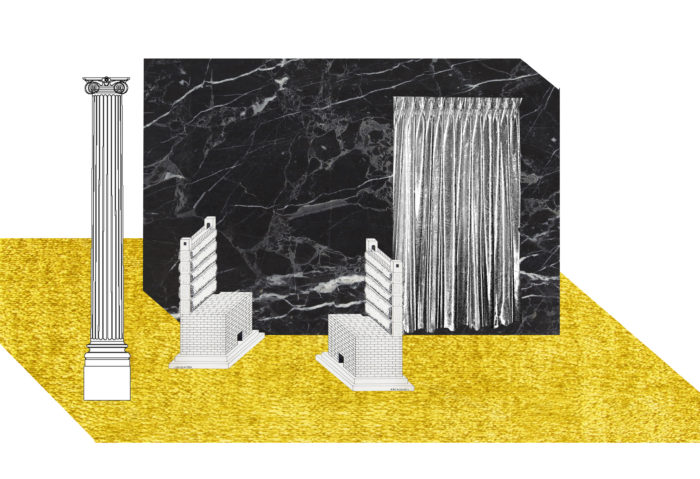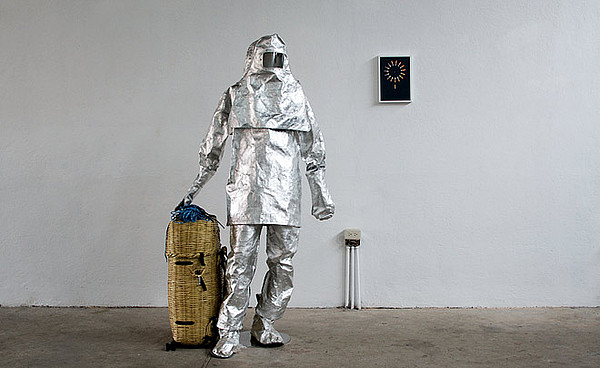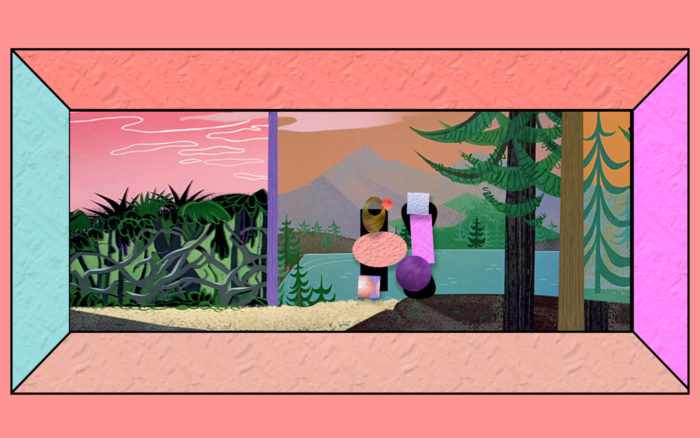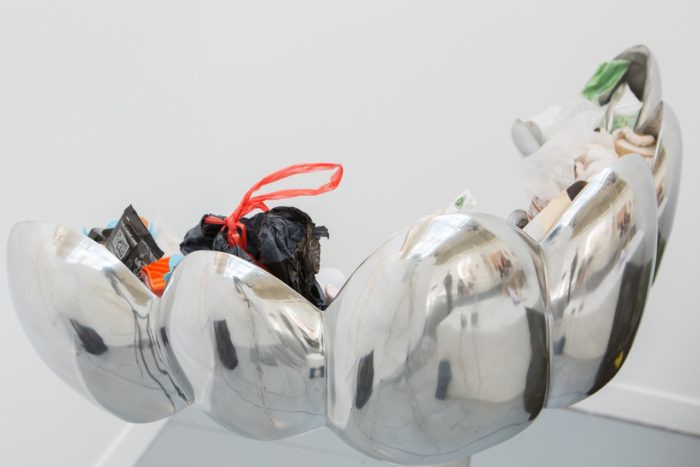The Future of What
Julieta Aranda, Chus Martínez, Trevor Paglen and José Luis de Vicente speculate on the future of politics and Art-making
In February 2018, ARCO Madrid hosted a round table titled What is Going to Happen is not the Future but what We Are Going to Do, where Chus Martínez, José Luis de Vicente, Julieta Aranda and Trevor Paglen discussed the concept of “future without futurology” in a tentative endeavour “to address what currently feeds art and society: economy, nature, technology, gender, coexistence, privatisation, education, protection of the cultural sphere, autonomy and form of the institutions.” This is the transcription of the discussion. Thanks to the participants and the curators Chus Martínez, Elise Lammer, Rosa Lleó, who are featured also in the book What is Going to Happen is not the Future but what We Are Going to Do (NERO, 2018)
MINISTERS OF THE FUTURE
José Luis de Vicente: In 2017, at CCCB in Barcelona, we launched the idea of a Ministry of the Future, which we described as “an artistic initiative to convince governments around the world that they should put in place mechanisms for long-term policy.” What’s the meaning of such an initiative? Well, let’s put it this way: the structure of the political system gets shorter and shorter. That is to say, the architecture of the current political system only has short-term incentives, short-term means, and short-term actions. But these short-term incentives are deployed in an age in which we are forced to commit to long-term scenarios. Just think of the Paris Agreement: we are committing to vastly lowering our CO2 emissions by 2100. Now, it’s kind of hard to commit to a eighty-two-year-long scenario in an age when, in Catalunya for instance, we have run through four elections in seven years.
What we see here is a kind of contradiction. It is paradoxical that the scheme in which we would have to operate—a short-term one—works within a long scheme of longer commitments. At the same time, the year 2100 may seem very distant, right? But if we think about it, it turns out that it isn’t at all. The people born today will likely be alive in 2100. So, there is a paradox operating there on two levels, and that’s where the idea of a Ministry of the Future comes from.
The driving question of a Ministry of the Future is: What would it be like if every government had a cabinet member whose constituency are not the voters of today, but the people who cannot vote, either because they don’t have the capacity to vote, or because they are still not eligible (because they have not been born yet)? But also, very importantly, what about those who are not humans but whose future is as directly tied to our commitment to the Paris agreement as the goals of humans are to the environment?
Chus Martínez: So, is the Ministry of the Future a metaphoric notion or a non-metaphoric one?
José Luis de Vicente: Well, in a way, there’s absolutely a metaphoric level here, because you would have to actually be able to establish an open negotiation with some political structure, saying “There is somebody who does not respond to your constituency;” to put it briefly, the voters would have to select someone who does not respond to the voters. And I don’t even know if there is any political system that can resolve that contradiction…
Chus Martínez: I see. But if we turn to the non-metaphoric aspects of such an idea, what would be the difference between a Ministry of the Future and other organizations that deal with both humans and non-humans, such as, let’s say, Greenpeace?
José Luis de Vicente: Well, Greenpeace has very specific goals and very specific targets. The Ministry of the Future, on the contrary, would have to establish a political culture for deep time. That is to say, a political structure that can commit to eighty-year goals, surpassing and bypassing the limitations of the current political system. In such a context, I think the core is a new political economy. Now, such a goal is of course very difficult to achieve. It’s one thing to talk about it in small circles and local situations, and another thing to develop a dialogue through a UN initiative. We’re not even saying this is achievable, we’re just saying that this problem is on the table. The issue with initiatives like the Paris Agreement is that they still refer to a five-year time frame, which is a time frame that was once used to plan economic structures and so on, but you know, no one operates like that anymore! I think it’s appropriate to say that we signed the Paris Agreement not because we especially believe in it, or even because we think it’s going to work. It’s just the base we’ve come up with for a problem that is real, a problem that is not going away.
Chus Martínez: But how does a “Minister of Future” operate? I mean, is the Minister of the Future a minister that you would find in every single government on Earth, like in a state-nation kind of structure? Or is the Ministry of the Future some sort of agreement among all the governments, like a supranational institution capable of going beyond the nation-state?
José Luis de Vicente: Actually, in a way it’s a space of reflection for agreements between county, city, state… Now, you already have places like Singapore, or some countries in the Middle East and even in Scandinavia, where there’s some sort of institutional figure devoted to “the Future,” and sometimes the official definition is indeed “Minister of the Future.” But these kind of figures are purely symbolic, they lack the political agency for long-term politics, which is basically the space that we think requires work and reflection.

Patricia Dominguez, Los ojos serán lo último en pixelarse, HD video, audio, 08:50 min, 2016
COLONIZING (DEEP) TIME
Chus Martínez: Ok, I think what’s interesting here is how we’re forced to reinvent the language we use to discuss such themes. Let’s think about a concept like “goal.” What we’re saying here is that “goals” aren’t suitable anymore, that we need to surpass the structures and find new ways to act. And yet, we’re facing a transformation in our language: not only in governments and institutions, but even among artists and artistic structures. The idea is that we really need to ask where we’re going, but the language we use is coming like a wave. Just think about water: when you talk about water, you normally frame that question in terms of access—we need to give people access to water, right? But framing the question simply in terms of goals and access doesn’t really take you anywhere. Because it applies a cyclical time of replicated political language (and political action) to something that is not necessarily political in the same way that we conceive society as being. And I think that’s a very interesting point. I still don’t know exactly what it means, but since we’re talking about how to surpass the political structure of “goals and agreements” and national-oriented governments, it’s interesting to reflect on it. Because even we—people in the artistic world—often rely on concepts such as “We need to save nature! We need to rescue it.” Basically, nature becomes our next colonial project.
Julieta Aranda: That’s something I’ve been thinking about a lot. But before we go further, I think it’s important to reflect on the notion you were discussing—this current obsession with framing the future as something that is legislated. What I’ve been thinking about is that this is because, in our colonial framework of humanity, we have completely run out of space to expand upon. We’re already accustomed to geometric progression, and we’ve been thinking so much about the limits of growth and the ways we are supposed to develop and grow and expand… Since getting off-planet is (still) not quite viable and we are not able to expand in exterior space, we have to expand in time. What I see taking place now is a kind of colonial process over time. The future is seen as this kind of thing that turns into a perpetual present. I think a lot about that when I get these offers from Amazon, where they tell me: “You don’t need to order anything, we’ll anticipate your desires,” and they send me a basket of things that I may possibly want. This is what I call “a perpetuation of the present.”
Something that I find quite interesting is that the future keeps being talked about as a singular thing, as if there would be one future that we’ll hung up, when we’re already living a number of presents. I recently started a project based on trying to divide the future into many components, many forms that can’t be legislated and can’t be turned into doomsday scenarios. Because, since the present is not singular and we have many many presents, by necessity the future is plural as well. The future isn’t necessarily this thing where you have humans speaking in the name of humanity and fighting against nature, wrestling the planet into submission and fighting for power. I think the singular future, the doomsday scenario, and the colonial narrative of humans vs the planet, are all part of the same discourse, a discourse that I’m trying to get away from.

Lin May Saaed, Dach der Welt – The Liberation of Animals from their Cages X, 2010 (detail)
Trevor Paglen: There is this landscape that is both spatial and temporal, whose contradictions are becoming more and more apparent. Capital is moving faster, increasingly colonizing micro moments of time. There are phenomena like high-frequency trading, or even Facebook and Amazon, which are colonizing moments of our everyday life that were previously not accessible to capital. Just think about Amazon now getting into healthcare. So, on the one hand, we have the fast colonization of ever more intimate moments of time; on the other, we have these greater and greater interventions into deep time, which translate into the colonization of the “many futures.” But the political landscapes and the way politics are currently structured, are completely contradicted by the deep time scales. And it’s a very confusing situation… I don’t even know if we have a concept of the political in terms of thinking on a temporal and spatial basis. I don’t know. But Chus, I get the sense that you have an idea of what the politics might be, if you could articulate that…
Chus Martínez: Well, I think what intrigues me is like… You know, when I was a student, for example, it was impossible to read about nature in philosophy courses. Culture was separated from nature in a way that it was not even a subject. Now the question has become: is nature the new subject? And then you can say: “No, it’s a new epistemological term if you want, but it’s not a subject.” We’ve all tried to defend that, but it’s also interesting that if you look at the so-called “deep ecologists” of the 1960s and 70s, you find out they were all women, and they were all perceived as mystics of a sort, using a language that is not at all the language that we are facing now. So, from Suzi Gablik, for example, you now arrive to Timothy Morton. We’re now addressing nature through a techno language that has also made male thinkers much more capable of possessing it and using technology as a tool to observe. Just think about the debate on the Anthropocene, and imagine that you’re about to write a book about the genderization of the studies of Nature. There has been a passage from the mystical voices of all those women in the 1960s to this kind of male figuration where technology is in the center. The Anthropocene is marking this new way of saying that humans can do it, that technology can help us but that it could also be our enemy. It allows us to talk about deep time. But deep time in a male voice is something technological; if a woman talks about deep time, then it’s something mystical, genital, and so on. So even the language has been isolated… And this is fascinating because somehow we need to keep it open. Language frames the political imagination that we have in front of us, so, how do we get away from it?
It’s a challenge. The issues of agency are very tied to who gets to speak. Obviously, if you don’t have access to language there’s not much you can say. So, we can say that a lot of what we’re discussing now about “the future” revolves around language.
There’s recent research that says the octopus makes jokes, and has a sense of humor in some kind of human-measurable terms—which is the only frame we have for measuring humor, of course. The thing is: we keep subjecting everything to our standards, and that is not the most efficient way to understand other subjectivities, because it makes us blind to them. If you don’t have access to language like this, there’s no possibility of being able to see other subjective capacities.

Teresa Solar Abboud, Ride, Ride, Ride, 2018, exhibition view, Matadero Madrid
ALIEN METAPHORS
Chus Martínez: Another anecdote I would like to mention regards the acacia tree. It was recently discovered that when there’s an increment of gazelles and they eat the leaves of the acacia tree, the tree gets really upset. The signal arrives to other trees further down the field: “There are too many gazelles!” and the trees start producing more cyano, because cyano is lethal to gazelles. So, you see, the tree actually kills the gazelles, and a lot of gazelles die. There’s an agency there, very very clearly, and this agency is also pretty ruthless. But what’s important here is that this agency operates not according to the human gold standard, or the anthropomorphic wheel of humans we’ve turned into.
Trevor Paglen: I think what you’re pointing out is absolutely right. How do we develop metaphors that we can use to have these imaginative political constituencies, or something like that? I guess in some of my projects—and in some things I’ve written as well—I’ve thought of it as the figure of the alien. I think about this language issue in the same way I think about aliens, and from what I understand there are basically two kinds of aliens. One is the alien with whom you have no ability or possibility to communicate, because there’s no common ground, you see? All you have is radical incommensurability. The other kind of alien is the alien of the so called Voyager Golden Record, the record which was included aboard the Voyager spacecraft in 1977, containing human sounds and images to communicate with extraterrestrial life. This kind of alien is the alien that you can imagine talking to. You do not know exactly how you’re gonna communicate, but you imagine that there is some kind of common ground. Thinking about the figure of the alien, I guess the place I’ve arrived at is something like this: What is the ethics of these different alien figures? And one may be tempted to think that, imagining the nature of the future, we should first of all refer to the first category of alien—the thing that is radically incommensurable with us. Whereas the second kind of alien would imply some kind of meta-humanism that would inevitably reproduce some kind of masculinist colonial relationship, right? But I don’t think that is necessarily true. Because then I think, if we take these figures and map them onto other beings that exist now, what happens? Let’s go back to the second category of the alien, the one you can sort of communicate with. What would you compare this alien to? Perhaps a dog? I know this sounds funny, but think about it. We talk to dogs. It’s not a problem, right? There’s actually a certain amount of meta-humanistic care that you can bring to a relationship with a dog, which is different than the one you have with trees—but also with chickens. We don’t imagine chickens as animals you can have a commensurable relationship with, we just slaughter them, we grow them and kill them in an extremely violent way. So I guess that maybe the best we can do in terms of imagining these kinds of ethical relationships is to adopt this almost meta-humanistic framework. To try to think the alien as a figure where there’s enough commensurability to also imagine some kind of ethical relationship.

Álvaro Urbano, Foro Futuro, 2017 (preparatory sketch)
Chus Martínez: I think there’s something about the future… in a sense, it’s like trading for the future by relating to the present. How can I expect to be able to speak to people 2000 years down the line, when I cannot speak to something that is sharing the present with me and keeps being this gigantic? I mean, you mentioned the Voyager Golden Record, and that has always made me laugh, because it assumes that aliens have vinyl LPs and headphones and turntables exactly like us in 1977! I mean, how arrogant is it to think that our modern technological progress is going to be recognizable by some other extraterrestrial entity?
You also talked about incommensurability and how we relate to aliens, and I’m thinking: OK, but we aren’t even able to relate to previous incarnations of ourselves. Just think of the Maya civilization, of ancient writings and so on: they’re still so unreal to us… And in a deep time perspective, this poses a problem. If we can’t relate so fully with ourselves, how can we develop commensurable relationships with the aliens?
Trevor Paglen: If we talk about commensurability, these contradictions are absolutely all very present. Let’s go back to the Golden Record metaphor. They’re putting this spacecraft out into the universe, right? And they want to communicate with extraterrestrial beings. Well, if you compare this experiment to the Tesla car out in space, I think that at least the Golden Record was actually a very genuine effort, even if it’s very historically specific and very much of that moment.
Julieta Aranda: Of course the Golden Record was genuine, and of course it had this higher purpose; but I would also say the Tesla car is much more effective at showing where we are technologically. It’s like saying: “Hey, there’s someone here who’s capable of doing such things and has developed this kind of technology.”
I had realized that certain kinds of satellites (mostly communication satellites) that are in orbit around the Earth are actually very very far away from the planet; and what happens when these kinds of satellites die is that they just stay there. So when you do the math and you see how long the satellite will be there, the answer is—forever.
José Luis de Vicente: I think the real question is: is there an ethics of care in the Golden Record? As far as I know, the Golden Record incorporated a tutorial on how to “play the record” or, to put it more correctly, how to make a Golden Record sound. So you see, if we take the Tesla example, paradoxically there is nothing you can do with a malfunctioning car. While playing a record, on the other hand, is very simple, I mean, you don’t even need electricity to fix it. The true paradox is what happens now with digital preservation. Technologically speaking, the Golden Record will still probably work way better than a golden CD or a golden hard drive or any possible way of compressing a message. But again, if we’re talking about Golden Records and the question is how to communicate with the alien, my answer would be more or less like, what is the alternative?
We now realize that the paradigm of using nature and resources as somebody else’s problem is over, and we know it’s over simply because there’s not enough left. Basically, it’s us and maybe another generation after us, but the truth is that we’re starting to run out of everything: temperatures are rising, the ocean level is rising, and so on. So, my question would be more like: If this is just sending a bottle to the five generations down the road, and kind of saying “OK, this is where we are now, this was our world map,” we’re probably gonna make mistakes. Because we know that there’s no temporal continuity between what we do today and the five generations down the road, right? But it’s exactly this translation, which is also a negotiation, that’s fascinating.
So, one question I would put to Trevor is, are there, for example, artists whose intended audience is aliens thousands of years from now? When you did that project that deals with satellites, space orbits and so on, what do you think that project did to us? Are we the only audience available as of now for that project?
Trevor Paglen: The project you’re talking about is a project that we literally “launched” in 2012. I had realized that certain kinds of satellites (mostly communication satellites) that are in orbit around the Earth are actually very very far away from the planet; and what happens when these kinds of satellites die is that they just stay there. So when you do the math and you see how long the satellite will be there, the answer is—forever. So I started thinking about the fact that humans have already made a ring around our planet, like the rings of Saturn; but the rings around Earth are made out of machines, out of technology of the twenty-first century—and this is now a permanent part of the planet that will still be there in billions of years. So, the project that I did was called The Last Pictures. It was done in collaboration with scientists at MIT, and its basic question was: Can we make a medium that is as archival as the sun and attach it to one of these satellites? And we did that! It’s an archival disc micro-etched with one hundred photographs and encased in a gold-plated shell. So you see, it is very “golden record” in a way. But it’s also much darker, in the sense that since it does stay around the planet, the question it poses is: Why are these dead spaceships here, and why are the people who made them not?
Obviously, The Last Pictures is a deeply paradoxical project. And I wonder, is it only possible to make nonsense for the future? That’s essentially the question. If you imagine an audience from the future, you have to decide. Do you think that they’re gonna be so incommensurable with the present that the only thing you can do is create nonsense? Or do you imagine there’s a level of commensurability, and you sincerely try to say something?
I guess where I’ve arrived, which is a very surprising place for me, is: No matter what you’re gonna do, because if it’s incommensurable that is nonsense either way—who cares, right? But if there is a chance that there is a commensurability, then you are ethically obligated to try to communicate, to be generous. I mean, if you meet a stranger, what is your ethical obligation to them? You take care of them as much as you can, even if you can’t talk to them.

Eduardo Navarro, Poema Volcánico, 2014
IMMORTALITY
Chus Martínez: A few weeks ago, we invited – to the Swiss school I direct – some of the guys from this team based in Oxford called Humanity+. They call themselves transhumanist and they defend certain theses, like for example, there’s gonna be a super intelligence and the future is gonna be guided by some principles, and one of those principles is the absence of pain. Also, the ultimate goal of transhumanism is basically immortality via technological implementations, and so on. It was all very interesting, and since we’re talking about incommensurability, the fact that they have this humongous imagination of immortality really fits here.
I mean, you have someone who announces immortality, and the obvious reactions is “Whoa, why not?”—but then one student asked: “Immortality? Like how?” And the guy from Humanity+ simply replied, “immortality.” So the student said, “But immortality, like the whole body or only parts of the body?” And he said, “Well there’s a big debate about it, but yeah, I think it would be desirable that in 3000 years you wake up yourself.” And the student said, “Yourself? You want to wake up yourself after 3000 years?” And the scientist said, “Yes, I’d love to wake up being myself.” And we were all like “Wooo, artists… This is out of our desire frame!” But then the debate went on, and the student asked, “Second thing: entirely you?” And the Humanity+ guy said: “Yes, desirably entirely me; but we are discussing it. We think it’s also possible that we only keep the head, you cryonize the head, but the body could be something else.” And at that point we all said, “Something else? Like… an octopus?” And they said, “No, no! Something else not to your body but in your mind, so that you could be super intelligent in your super body without super pain.” So you see, we were like, in 3000 years we don’t want to wake up being ourselves, looking like ourselves; and then the next question was, “OK but, if you wake up, when did you die?” And then the scientist said, “Well, when you die, you get cryonized and then you wake up; and you need to make a decision, because if you die when you die, imagine that in 3000 years you’ll wake up yourself being 78 or 89, and that is not desirable. So you need to make a decision of time. You don’t want to be dying at 92 and waking up in the same state, being a 92-years old person—it makes no sense, right?” But then the guy said “OK, let’s talk about another topic.” And the topic was: “We are not in favor of animals eating meat. We think in the future we need not to be predators, because this is causing some sort of pain. So we are advocating for a non-predating nature.” You know, like for example animals becoming vegan. And the students said, “This is a beautiful thing! Vegan lions!” And then the guy said, “Not vegan lions, because lions in 3000 years probably won’t exist.”
So, what does this story tell us? I think it shows how, in our imagination, deep time still seems to be implemented time, like a gigantic washing machine with a copy and paste button; the same phenomena you face now, you’ll face also in 3000 years. And listening to the Humanity+ guys I remember thinking, “Wow, we’re not getting it.”
My question is, we’re constantly talking about encounters, but what are these encounters? Encounters between the head and the vegan lion? The head and the washing machine? The head and the technology that has been against us? And also, where are we gonna produce these encounters? What do they mean? How do we change our current encounters into different encounters? How are we actually doing it? Because what we are evoking all the time still seems a bit flat to me… It’s still kind of a product of a certain science-fiction, basically.
Julieta Aranda: A lot of people are talking about immortality these days, but to me, when you start thinking about immortality, it’s almost like a failure of imagination. It’s like saying, “I refuse to see the passage of time and I refuse to see the passage of me, so I refuse to think about a world where I am not there.” It also has to do with having to rethink how we relate to resources, and this kind of stubborn refusal to do that. Failure of the imagination, we are immortal, we’re gonna live forever, we can’t imagine anything else.
Trevor Paglen: OK, but if you think for example about nineteenth-century Russian utopias—cosmism, Fedorov, and so on—you find that there is also something redeemable about the dream of immortality, which is this sort of trascendental communism, the goal of egalitarianism…
Julieta Aranda: Sure, but on the other hand, being immortal is also a way of colonizing time. I refuse to leave time for the generations to come, because I am the generation to come.

Ad Minoliti, -PLAY SIGNIFICANT OTHERNESS-, 2015
THE FUTURE IS NOT THE PRESENT
Chus Martínez: We talked a lot about incommensurability, but now I wonder, what can we do in order to implement part of this communication process? To modify those structures to include the archive of nature inside the archive of the document? Or to challenge all these notions in a new vocabulary? Santiago Alba Rico said that the only ones who are interested in the future are those who have children. Quoting Santiago, when you have children you develop a sense of care, of danger, of risk in a very pragmatic way. He probably doesn’t mean having children only in physical way, but also the idea of having children, the idea of continuity, the continuity of our relation that starts in a way that is kind of unaware. Infancy or childhood is a super interesting stage of the mind. Santiago wrote a beautiful essay saying that there’s another species within humans, which is precisely childhood. We are kind of colonizing and modernizing childhood by implying that children are not mature, that they’ll mature and become adults. But if you stop thinking that way, then you’ll encounter the first nature of that species.
We are using all these words that I am totally uncomfortable with, like “empathy,” which gives me this feeling of starting to merge with something. But it’s interesting that we don’t have a better word to replace it. The other day, I was in a deep learning lab with a few guys, asking them what deep learning was, how it works, and how to implement it in robotics. I asked them what they were doing, and they said they were trying to learn to teach the rules of searching, because if they lose something they don’t look for it—that’s kind of a primordial trait, isn’t it? And they said that to do that you have to create empathy with the robot, so the robot understands that if they lose something they have to look for it. So it refers to a different connectivity, a different way of transmission that does not imply only sentiments, like in the eighteenth and nineteenth century, and it also doesn’t imply ethical values, even if they are important. Something that could become much more of a new behavior rather than an ethic. Because otherwise we just end up promoting a new ethical behavior, which I’m very skeptical of. So how do we deal with that?
Julieta Aranda: To me, it has to do with something that I mentioned before—agency. That’s not just communicating five or ten or twenty generations down, but communicating in a horizontal manner.
Chus Martínez: It’s true, but just think about this: We’re here in Spain now, and in Spain there is all this nationalism coming from Catalogne and so on, and I start thinking: we’re not even able to face nationalism, imagine facing an “octopus education!” I mean, how do we combine given political structures with necessary new ones?
Julieta Aranda: Things that actually seemed completely unobtainable five years ago are now front page news, which is really terrifying. It becomes hard to think about the agency of the octopus when I have to think about the agency of the Syrians. But I want to broaden my view and think, “OK, I want to be able to think about both.” And it’s not something you should see in a line; it should be dealt with horizontally, trying to take care of all of it. I want to think that the future is right now, the future is the present. And if I think of the future as the present, then I can start addressing issues. And to me, simply trying to address these things is already solving the problem. I can create a politics that’s livable.
Chus Martínez: I think the most important thing is philosophy. The most important solution is allowing artists to protect their work. It’s the only solution I can think of in a practical way. It’s a very difficult and dangerous language, because the only thing that I aim at is to produce even more complexity and more ambiguity, so I have absolutely no interest in coming up with a point. But the present is now, the now is plural and it’s very complex and it’s not even synchronized… So, you see, to synchronize something means to solve it.

Lili Reynaud-Dewar, TEETH, GUMS, MACHINES, FUTURE, SOCIETY (Darius), 2016


